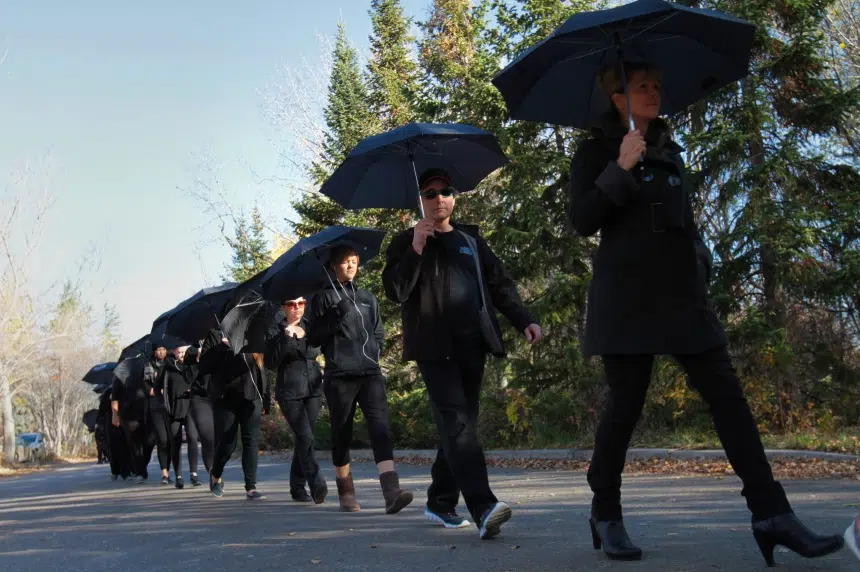Dressed in all black, walking single file and carrying umbrellas, dozens of people streamed through downtown Saskatoon Saturday morning to raise awareness about human trafficking in local communities.
The second annual A21 Walk for Freedom is a global effort to end human slavery, which the campaign estimates affects 27 million men, women and children around the world.
“We cannot just feel compassion for these people. Compassion with no action is nothing at all,” volunteer and co-organizer Sam Boctor said.
The name A21 derives from the group’s mission to abolish human trafficking in the 21st century.
Around 125 people came out in Saskatoon to show support. Among them was former prostitute Sheila Poorman.
Poorman, 45, said she was introduced to the world of human trafficking at the age of 13, when a man got her drunk and paid her to have sex against her will. She said the shame and guilt she felt started her life down a path of self destruction, drug abuse, depression and prostitution.
“I just started working the streets to numb all the pain I’d already been through,” she said.
After being diagnosed with Hepatitis C, Poorman said she knew she had to escape the sex trade. Working with local church groups, she got sober and learned how to get her life on track without resorting to prostitution.
Angela Sheriff also escaped a life of prostitution.
“Some people think that it’s a choice; that I chose,” she said. “Yes, but it was at a point in my life when I was a single mom, and I felt there was no other way because I needed extra money for diapers and formula and pay bills.”
Though she has been clean and celibate for 10 years, she said she had only been open about her history for the past four.
Despite being out of the sex trade for a decade, she said it took her five years to realize who she was and what she was capable of.
“To be a woman again is amazing,” she said, adding being open about her past with others is crucial to bringing a human face to trafficking. “They are seen as not human, and that’s the sad part. People could be driving up and down 20th Street and there’s a young girl on the corner, but they don’t realize that’s actually somebody’s daughter, who has a mother that cares, who is dealing with depression and addiction and the abuse they’ve endured.”
Poorman said attention must also be given to users of the system, such as Johns. Today, she teaches men that their actions do affect the people they pay to have sex with.
“These men are also stuck in that lifestyle. They have an addiction also,” Poorman said.
She said the first step for society is to acknowledge those affected by slavery as human and in need to support. She would also like to see more facilities that help individuals get back on their feet.
“There is hope,” Sheriff said. “There is people here that want to help and just have the courage to reach out. We’re here for you.”











